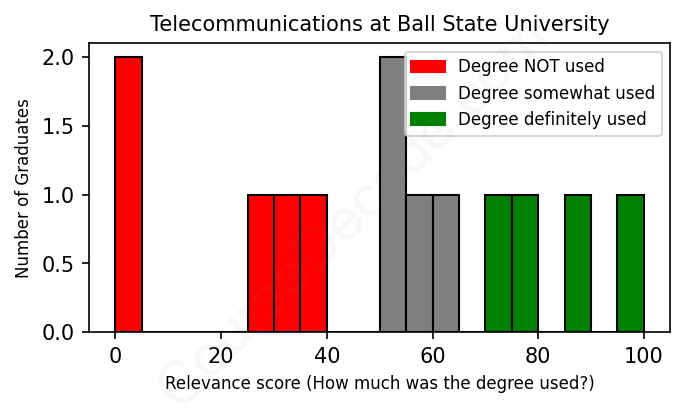
First, some facts. Of the Telecommunications graduates from Ball State University we've analyzed , here's how many have used (or NOT used) their degree in their career:

These are estimates based on AI analysis of 13 LinkedIn profiles (see below).
The verdict? Significantly below average. Overall, with an average relevance score of 50%, Telecommunications graduates from Ball State University have a much lower likelihood (-17%) of finding work in this field compared to the average graduate across all fields:
And for comparison, here's the chart for all profiles we've looked at across all degrees.
Also, after graduating, only 15% of these graduates have pursued further education other than another Bachelor's degree (such as a Masters degree or other), compared to the average across all profiles of 35%. This suggests a Bachelors degree is enough for most Telecommunications graduates, and it's normal to look for work straight after graduation.
See the details:
|
Relevance score: 38% We think this person has NOT gone into a career related to their degree. We think this person has NOT gone into a career related to their degree.
DEGREE INFOGraduated in 2018 from Ball State University with a Bachelor's degree in Telecommunications. No other secondary education since. JOB HISTORY SINCE GRADUATIONSales And Marketing Intern MonoSol, a Kuraray Division May 2018 - Aug 2018 Image Processing  Label Insight, Inc. 2019 - Oct 2021 Content Creation Specialist  TIMA | Travel Industry Marketing Association Jul 2021 - Jun 2022 Social Media Coordinator  Freelance Jul 2022 - Apr 2023 Digital Marketing Manager  MOXI, The Wolf Museum of Exploration + Innovation Apr 2023 - Present ABOUTContent Creator focusing on Digital Content Creation and Social Marketing. |
The top 10 most common jobs done by the graduates we've analyzed (ranked most common to least) are:
When looking at the career paths of people who graduated with a Telecommunications degree from Ball State University, you'll notice a mixed bag of job roles. Many alumni found themselves in positions like Video Editor or Multimedia Journalist, where they directly applied their telecommunications skills in video production and media. These roles really align well with what they learned in school, focusing on the technical and creative aspects of telecommunications. However, there are also quite a few who veered off into marketing, operations, or other fields where telecommunications knowledge isn’t front and center. For instance, some graduates ended up as directors of marketing or started their own marketing agencies, which is more about communication and management than telecom tech.
Overall, while there’s definitely a subset of graduates that landed jobs closely related to telecommunications—like Technical Media Producers and Hub Operators—many others have drifted into roles that don't require the specific skills they studied. This shows that while their degree may give them a unique edge in communication-based jobs, a significant portion of alumni have taken paths that don't explicitly connect back to telecom, making their job relevance a little hit or miss. It's a reminder that sometimes a degree can open doors to a variety of fields, even if they aren’t all directly related to what you studied!
Here is a visual representation of the most common words in job titles for Telecommunications graduates (this is across all Telecommunications graduates we've analyzed, not just those who went to Ball State University):

When looking at the career trajectories of graduates from Ball State University with a degree in Telecommunications, it seems like there’s a mix of outcomes. For many, their first job after graduation often ties back to roles related to media, editing, or production. For example, several graduates from the class of 2011 found their way into video editing and digital media roles, showing a clear alignment with telecommunications skills right out of the gate. Other graduates took on roles that loosely connect to the field, like staffing or marketing, which might not fully utilize their telecommunications education but still leverage skills around communication and technology.
Fast forward five to ten years, and it appears that many graduates have continued to carve out careers in related fields, especially in media and marketing. Roles like Digital Media Specialist, Content Strategist, and various production positions show that a good number of alumni are establishing themselves in industries that value their telecommunications background. However, there are also examples where individuals have diverted significantly, ending up in roles that appear less directly related to telecommunications. Overall, while there are some success stories that play to the strengths of their degree, there are also those who may feel as though they haven’t fully capitalized on their education in the telecommunications arena. It’s a mixed bag, but many are finding their way into meaningful positions, even if they stray a bit from traditional telecommunications roles.
Honestly, a Bachelor’s degree in Telecommunications can be a bit of a mixed bag when it comes to difficulty, but many students find it a manageable challenge. At Ball State University, like many places, you’ll dive into tech concepts, communication theories, and maybe even some hands-on projects, which can be really interesting if you’re into that stuff. Some classes might be more challenging, especially the technical ones where you get into the nitty-gritty of networks and systems, while other courses, like those focused on media and communication, might feel a little easier and more relatable. Overall, if you have a genuine interest in technology and communication, you’ll probably find the coursework engaging and doable, maybe even easier than some other degrees out there!
Most commonly, in the LinkedIn profiles we've looked at, it takes people 4 years to finish a Bachelor degree in Telecommunications.
So, looking at these Ball State grads’ career paths, it seems like they’re doing alright, but it really varies by person. Some graduates, especially those in roles like Digital Media Strategist and Executive Vice President, likely make decent salaries since those positions usually pay well and indicate they’ve climbed the ladder pretty quickly. Others, like the one working as a cashier at Buffalo Wild Wings or the one still in an early role like a youth support specialist, probably aren’t raking it in just yet. Overall, there’s a mix of solid paychecks and some more modest ones—typical of the job market, you know? It looks like if they keep advancing in their careers, they could definitely start making some decent money down the line!
Here is a visual representation of the most common words seen in the "about" section of LinkedIn profiles who have a Bachelor degree in Telecommunications (this is across all Telecommunications graduates we've analyzed, not just those who went to Ball State University). This may or may not be useful:

Here are all colleges offering a Bachelor degree in Telecommunications (ordered by the average relevance score of their Telecommunications graduates, best to worst) where we have analyzed at least 10 of their graduates:
| College | Score | Count |
|---|---|---|
 University of Florida University of Florida
|
64 | 10 |
 Penn State University Penn State University
|
53 | 11 |
 Ball State University Ball State University
|
50 | 13 |